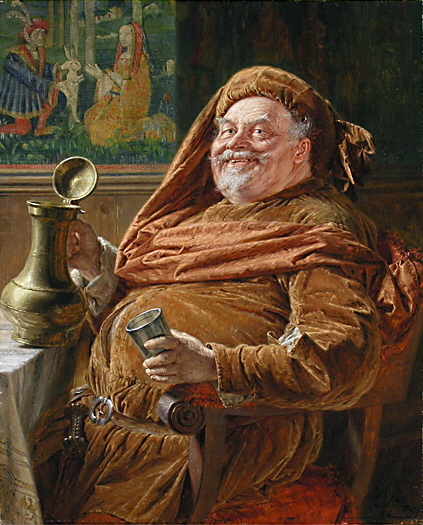n. 1. a violent, turbulent or brawling woman; 2. (cap.) a deity erroneously ascribed to Islam by medieval European Christians and represented in early English drama as a violent character; a mythical deity popularly believed in the Middle Ages to be worshipped by the Muslims and introduced into the morality play as a violent, overbearing personage in long robes; 3. (adj.) violent, turbulent, brawling, shrewish.
[Origin: from French name given to mythical Muslim god: Termagaunt]
Although it too is not in common usage today, shrew ("a woman of violent temper and speech") is better known than its near synonym, termagant. Both words are familiar to readers of Shakespeare.
 Near the end of Part One of Henry IV (Act V, Scene IV), Falstaff (a jolly, fat and unscrupulous knight) bellows, "Embowelled! if thou embowel me to-day, I'll give you leave to powder me and eat me too to-morrow. 'Sblood,'twas time to counterfeit, or that hot termagant Scot had paid me scot and lot too."
Near the end of Part One of Henry IV (Act V, Scene IV), Falstaff (a jolly, fat and unscrupulous knight) bellows, "Embowelled! if thou embowel me to-day, I'll give you leave to powder me and eat me too to-morrow. 'Sblood,'twas time to counterfeit, or that hot termagant Scot had paid me scot and lot too."The termagant Scot that Falstaff is referring to is a man, Archibald, the 4th Earl of Douglas. So why did termagant come to mean an aggressive or violent woman? Because in morality plays of the Middle Ages, the stock Termagant character was always depicted in long, flowing feminine gowns. English audiences got the idea that the Termagant character, though portrayed by male actors, was female. As a result, termagant came to mean a shrewish woman who was a common scold ("a woman who scolds with loud and abusive speech").
In Shakespeare's Hamlet, Prince of Denmark (Act III, Scene II), Hamlet speaks the word in its capitalized sense, as a (mythical and supremely violent) Muslim deity: "O, it offends me to the soul to hear a robustious periwig-pated fellow tear a passion to tatters, to very rags, to split the cars of the groundlings, who (for the most part) are capable of nothing but inexplicable dumb shows and noise. I would have such a fellow whipp'd for o'erdoing Termagant. It out-herods Herod. Pray you avoid it."
For reference, periwig-pated means he was wearing a powdered wig on his head of the sort that were fashionable starting in the time of Shakespeare (early 1600s) and ending in the age of George Washington, when they went out of style. Groundlings were members of the audience who sat in the cheap seats. And Herod, viewed from the Christian perspective, was an evil king of Judea who, according to Matthew 2:16-18, ordered the killing of all male children two years old and younger in the village of Bethlehem, in order to prevent losing his throne to a newborn King of the Jews (Jesus of Nazareth), whose birth had been announced to him by the Magi. (Of course, this story in Matthew is entirely fictional.)
Insofar as we disparage a woman of loud and violent temperament today, we refer to her as a bitch ("female dog"). Alanis Morisette sings, "I'm a bitch, I'm a lover, I'm a child, I'm a mother;" Snoop Dogg raps, "So all my bitches and my niggaz and my niggaz and my bitches, Wave your motherfuckin hands in the air;" and Eminem croons, "Bitch, please - you must have a mental disease, Assume the position and get back down on your knees." That much bitching gets old. Might I suggest to contemporary performers that they occasionally substitute shrew or termagant for bitch?

No comments:
Post a Comment